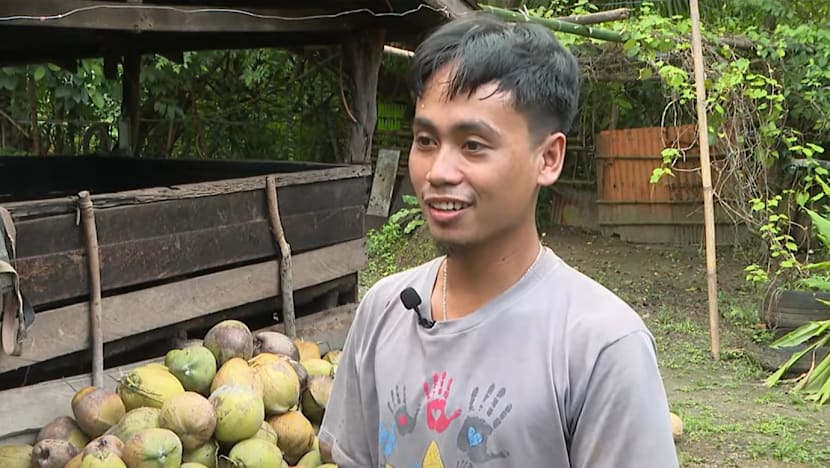World
Philippine Coconut Farmers Face Challenges from Climate and Prices

Coconut farmers in the Philippines are grappling with numerous challenges that threaten their livelihoods. Workers like Alexis Rea, who relocated from Manila to his hometown of Atimonan in Quezon Province, face difficulties in securing stable employment despite earning a higher wage. Rea, who left his previous job five years ago to be closer to his family, stated, “I earn just enough for our daily needs, so when one job on a coconut farm ends, I have to find another.”
The Philippines is the world’s second-largest producer of coconuts, trailing only Indonesia. Coconut oil stands as the country’s top agricultural export, with annual exports reaching an average of $2 billion. This trade supports approximately 3 million Filipino farmers. Despite these figures, ongoing issues such as climate change, fluctuating market prices, and an ageing coconut tree population are undermining efforts to rejuvenate the industry.
Ageing Trees and Replanting Initiatives
As of 2023, the Philippines boasts around 3.6 million hectares of coconut farms. However, many of these plantations are home to ageing trees that significantly reduce productivity. Trees older than 50 years yield less than half of what younger trees can produce. Ferdinand Marcos Jr., the President of the Philippines, has set an ambitious goal of planting 100 million coconut trees nationwide by 2028, the end of his term.
Some farmers, such as Rose Pena, find it more practical to seek government permits to cut down these trees instead of attempting to replace them with alternative crops like dragon fruit. Pena remarked that the profits from her family farm are insufficient to meet their needs, and while she has explored producing various coconut-based products as a hobby, significant investment is required to innovate. “More investments are needed to process coconut-derived products, not just oil but even non-food items,” she stated.
Market Volatility and Global Competitiveness
The recent World Coconut Congress, held in Manila, provided a platform for industry stakeholders to address the future of coconut production. Concerns were raised about maintaining global competitiveness amidst rising competition from palm oil and the pressing need for price regulation. Fluctuating prices of coconut oil, particularly influenced by supply shortages during natural disasters like typhoons, remain a primary concern for farmers.
Marco Reyes, chairman of the United Coconut Association of the Philippines, emphasized the critical need for a sustainable supply, stating, “This is the most pressing issue – we don’t have the coconuts to serve our consumer (export) markets.” He pointed out that while large firms can invest in technology and ensure their products meet export quality, farmers’ cooperatives often lack the necessary capital.
The Philippine government is working on initiatives to create shared processing facilities, allowing farmers to produce value-added products independently. Nevertheless, industry leaders warn that individual farmers risk bankruptcy during periods of drastic price decline, a risk larger corporations can often absorb.
To mitigate these risks, some suggest that state policies should focus on boosting domestic demand for coconut products. This could include increasing the share of coconut oil in the mandatory local fuel blend, which would help stabilize local prices and create a more reliable market for farmers.
Until these pressing market challenges are resolved, coconut farmers like Rea and Pena will continue to face uncertainty. The struggle for economic opportunities in the Philippines’ coconut industry remains a critical issue, one that demands attention and action from both the government and private sector.
-

 Business5 months ago
Business5 months agoKenvue Dismisses CEO Thibaut Mongon as Strategic Review Advances
-

 Lifestyle4 months ago
Lifestyle4 months agoHumanism Camp Engages 250 Youths in Summer Fest 2025
-

 Sports4 months ago
Sports4 months agoDe Minaur Triumphs at Washington Open After Thrilling Comeback
-

 Sports5 months ago
Sports5 months agoTupou and Daugunu Join First Nations Squad for Lions Clash
-

 Top Stories5 months ago
Top Stories5 months agoColombian Senator Miguel Uribe Shows Signs of Recovery After Attack
-

 World5 months ago
World5 months agoASEAN Gears Up for Historic Joint Meeting of Foreign and Economic Ministers
-

 Health4 months ago
Health4 months agoNew Study Challenges Assumptions About Aging and Inflammation
-

 Business5 months ago
Business5 months agoOil Prices Surge Following New EU Sanctions on Russia
-

 Entertainment4 months ago
Entertainment4 months agoDetaşe-Sabah Violin Ensemble Captivates at Gabala Music Festival
-

 Entertainment4 months ago
Entertainment4 months agoBaku Metro Extends Hours for Justin Timberlake Concert
-

 Top Stories5 months ago
Top Stories5 months agoRethinking Singapore’s F&B Regulations Amid Business Closures
-

 Business5 months ago
Business5 months agoU.S. House Approves Stablecoin Bill, Sends to Trump for Signature









